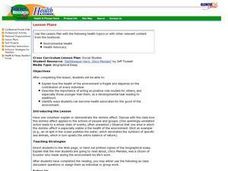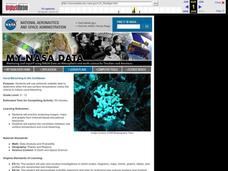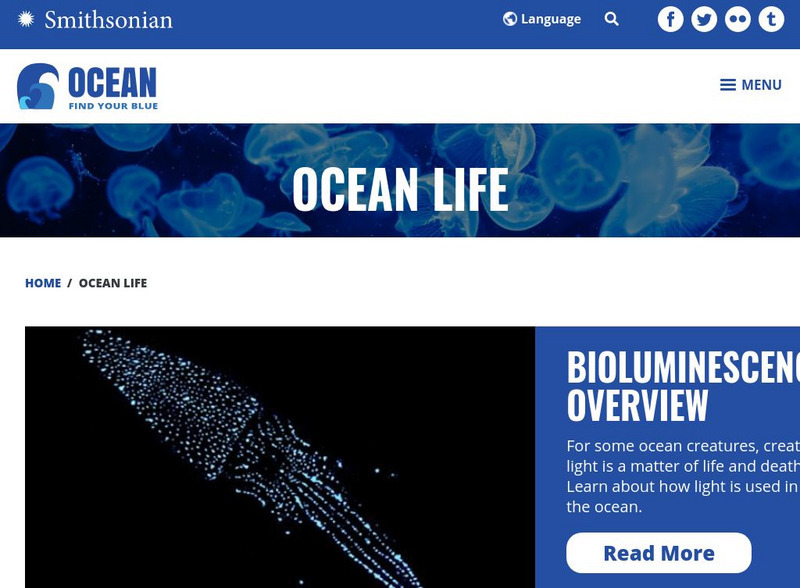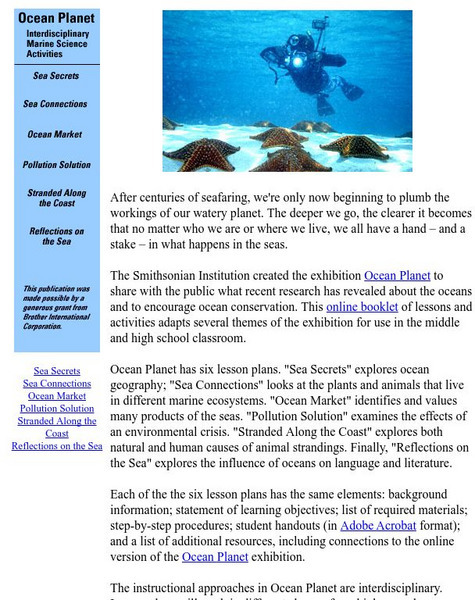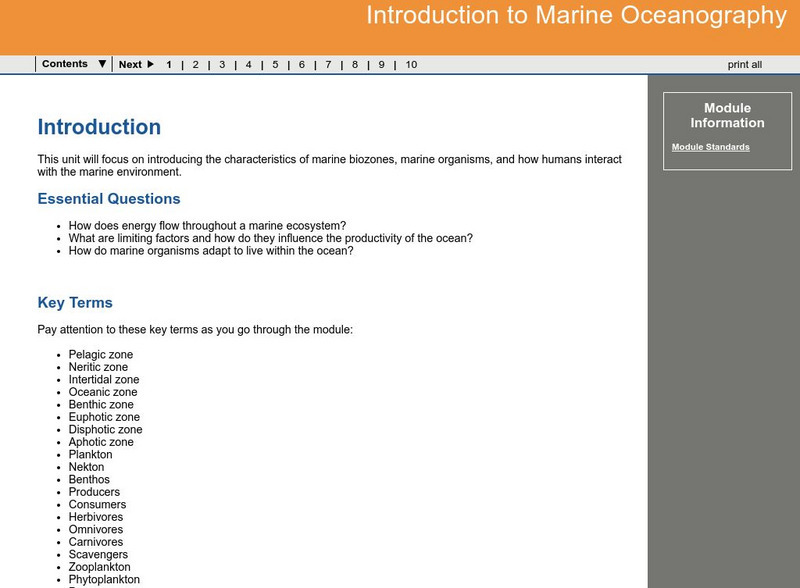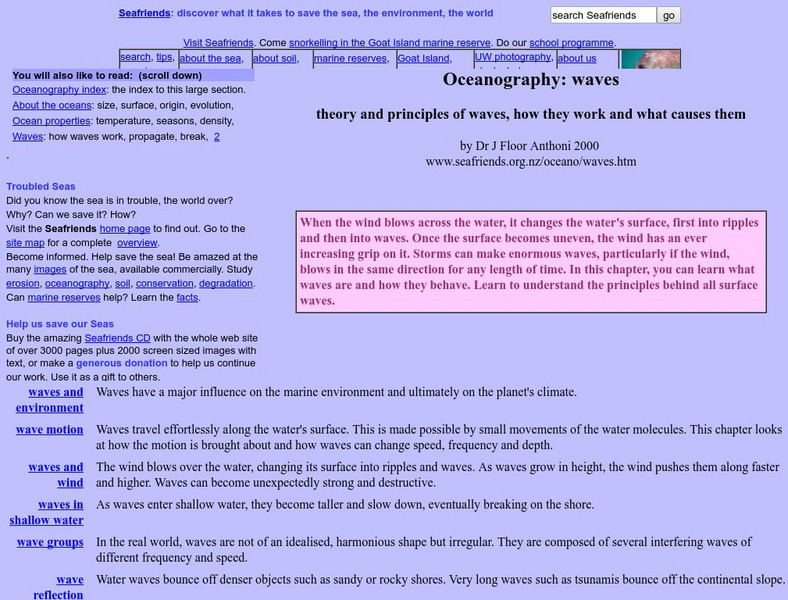Curated OER
Fighting Conservation Crime
Pupils identify and interpret the evolution and sources of law in Canada. Students compare and contrast the legal rights and responsibilities of individuals, groups, and organizations in Canadian society. Pupils write a one-page...
Curated OER
Learning About Mammals
Young scholars study the mammal classification and forms of them living in the United States. In this mammal study lesson, students read through orders of mammals that exist in the United States. Young scholars also study the taxonomy of...
Curated OER
Biographical Essay
Tenth graders explore the importance of the environment and ow fragile it is.
Curated OER
What Lies Beneath the Upper Crust?
Students discover if information in an article is accurate and current. In this science lesson, students read the story carefully and decide on what the subject of the article is. Students search the Internet to see more information...
Curated OER
Swim Like a Whale or Fish?
Young scholars recognize the difference between whales and fish by categorizing them according to their method of swimming. They synthesize this information by simulating the swimming patterns of whales and fish and comparing it to their...
Curated OER
Coral Bleaching in the Caribbean
Learners use authentic satellite data on the NASA website to determine when the sea surface temperature meets the criteria to induce coral bleaching.
Curated OER
Algae
In this biology worksheet, students identify and locate various vocabulary terms pertaining to algae. There are 54 biology terms located in the word search.
Smithsonian Institution
National Museum of Natural History: Ocean Portal: Ocean Life & Ecosystems
From the tiny to the titanic, from the familiar to the undiscovered, the ocean offers a stunning diversity of marine life and nearly every kind of habitat imaginable. Dive in and explore them here. Links incude stories, videos and photos...
American Museum of Natural History
American Museum of Natural History: Milstein Hall of Ocean Life
Tour the museum's famed exhibition hall dedicated to ocean life at this online recreation. Find videos, maps, species specimens, and images that let you experience many of the museum's resources on ocean life right from your desktop.
American Museum of Natural History
American Museum of Natural History: O Logy: Marine Biology: The Living Oceans
This resource is a place for exploring, asking questions, finding information, meeting scientists, and learning about marine ecosystems.
Smithsonian Institution
Smithsonian: Ocean Planet: Interdisciplinary Marine Science Activities
Smithsonian Institution presents ?Ocean Planet: Interdisciplinary Marine Science Activities?. Through this series of six interdisciplinary lessons, students will look at such things as the organisms in different marine ecosystems, the...
National Geographic
National Geographic: Human Impacts on Marine Species
Students learn about three examples of human impacts on marine life: migration patterns and shipping, algal blooms and water chemistry, and marine debris. Some of these impacts are due to human activity in the ocean, and some impacts on...
DOGO Media
Dogo News: Tiny Sea Animals May Drive Sea Currents
New research suggests that very tiny sea creatures in very huge numbers may contribute to the movement of the oceans' currents. Debate and more research are still necessary to prove this. Includes video.
Scholastic
Scholastic: Ocean Life
Good starting point for researching ocean life. Find general information, research-topic ideas, a glossary of important terms and people, and numerous links to related sites.
Georgia Department of Education
Ga Virtual Learning: Introduction to Marine Oceanography
Students learn about marine biozones, marine organisms, and how humans interact with the marine environment.
Other
Seafriends Marine Conservation and Education Centre: Oceanography: Waves
A very detailed article on the characteristics of waves and wave behavior. It discusses the influence waves have on the marine environment and the global climate, the physics of wave motion, the interactions between waves and wind, wave...
American Museum of Natural History
American Museum of Natural History: O Logy: Marine Biology
Learn about marine biology, life in the ocean. It defines marine biology and provides links to games, stories, videos, and hands-on activities on the topic.
Smithsonian Institution
Smithsonian Learning Lab: Contrasts in Blue: Life on the Caribbean Coral Reef and the Rocky Coast of Maine
Smithsonian Education presents Contrasts in Blue: Life on the Caribbean Coral Reef and the Rocky Coast of Maine. Teachers can download this comprehensive teaching package in which students explore two marine ecosystems, the coral reefs...
NOAA
Noaa: Ship Okeanos Explorer: "America's Ship for Ocean Exploration"
Follow teams of scientists as they explore marine life and habitats of the deep ocean. Covers past and current expeditions in various regions of the world. Includes webcasts, videos, lesson plans and modules, and career resources. An...
Tramline
Tramline, Inc.: Virtual Ocean Field Trip
In this enchanting site, students will learn basic principles about oceans and will be introduced to an assortment of sea life, both plant and animal. Other interesting ocean links can be found on the teacher resource section of this link.
NOAA
Noaa: Living Ocean Gallery Invertebrates
Many still photographs and video clips of marine invertebrates are available in this huge collection.
Georgia Department of Education
Ga Virtual Learning: Marine Invertebrates
Students learn about invertebrates found in the ocean, their individual methods of adaptations, identifying characteristics, and contributions to the marine ecosystem.
Georgia Department of Education
Ga Virtual Learning: Marine Vertebrates
Learn about vertebrates found in the ocean, their individual methods of adaptations, identifying characteristics and contributions to the marine ecosystem.
Smithsonian Institution
National Museum of Natural History: Ocean Planet
Detailed website that was a companion to a 1995 traveling exhibit of the Smithsonian. Links to lesson plans and other educational materials are at the bottom of the page. Enter the exhibition to explore the world of the ocean.




